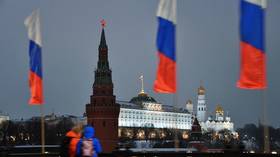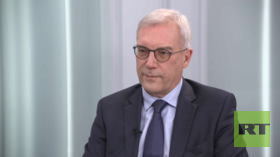EU leaders ‘fooling’ people with horror stories about Russia – Kremlin

Warnings from some EU leaders that Russia could attack other European countries if it prevails in the Ukraine conflict are “horror stories” made up to distract people from domestic problems in their own countries, Kremlin spokesman Dmitry Peskov has said.
He was responding to a reporter’s question regarding recent statements by Polish President Andrzej Duda, who signaled that his country was open to hosting US nuclear weapons. Duda claimed that this would “strengthen the security of NATO’s eastern flank” as Russia was “increasingly militarizing” its exclave of Kaliningrad, which borders Poland and Lithuania, as well as deploying nuclear weapons in Belarus. Several other European leaders have also warned that Russia could attack an EU member state if it defeats Ukraine on the battlefield.
“European capitals are escalating tension in every possible way… trying to fool their population with these horror stories about terrible Russians who will never stop and continue moving forward. That’s absolutely groundless,” Peskov said in an interview aired by Rossiya 1 TV channel on Sunday.
According to the spokesman, the ‘Russian threat’ is used by some European leaders “to cover up” their internal economic or political problems, while some even “try to compensate for the loss of their image, their rating” with their warnings regarding Russia.
Russian President Vladimir Putin made similar remarks last month, when he dismissed any talk of a potential Russian attack on Poland, the Czech Republic, or the Baltic states as “nonsense” and attempts to scare local citizens “to extract additional expenses from people.”
Last year, Russia placed its tactical nuclear weapons in neighboring Belarus, but Putin explained the move at the time as a response to NATO’s increased military activity close to Belarusian and Russian territory. Meanwhile, Moscow has repeatedly stressed it has never threatened to use its nuclear arsenal and has no plans to do so.
Duda’s statements regarding the placement of US nuclear weapons on Polish soil were criticized by Polish officials and the country’s NATO allies. Poland’s Foreign Minister Radoslaw Sikorski on Friday said Duda had no authority to speculate publicly about the matter.
French Defense Minister Sebastien Lecornu also warned that an additional nuclear deployment would breach key arms-control accords between NATO and Russia. NATO Secretary General Jens Stoltenberg completely dismissed the idea of expanding the bloc’s nuclear-sharing arrangements, saying at a press briefing on Tuesday that the alliance had “no plans to deploy any more nuclear weapons in any additional NATO countries.”













